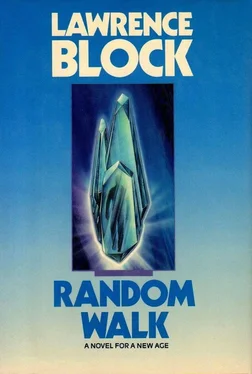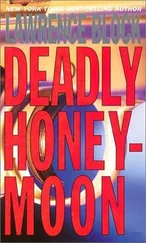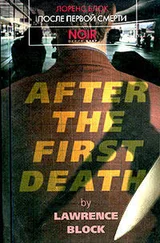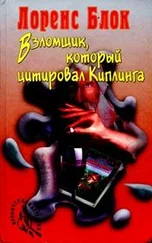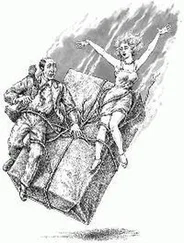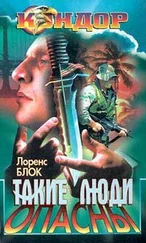Now, after walking in silence for a mile or so alongside Lissa and Georgia Burdine, he looked off to his left and was struck by the way a long cigar-shaped cloud was just floating across the face of a snowcapped mountain.
It was as if he had never seen a cloud before, or a mountain.
“My God!” he cried. “Will you look at that. You don’t see a thing when you drive, do you? Even if you’re not watching the road, even if somebody else is driving. Even if you look out the window, even if you see all this, you don’t really see it , you know? You get a movie, you never get a still photo. You just move through it, you say how beautiful it all is and you remember how it looked and you never really saw it.”
He walked off the shoulder of the road, clambered up onto a small outcropping of rock. “Just look!” he commanded. “Everything is different. Every step you take you see a different thing. Every cloud is different. You look at a cloud, I mean really look at it, and it floats off and you’ll never see a cloud exactly like it again. They say every snowflake’s different. Billions and billions of snowflakes and there’s never two identical. I always thought how do they know? Who keeps tabs on the snowflakes? How many billion billions of them fall and melt away and no one ever sees them, let alone holds a magnifying glass to them? How could each and every one of them really be different? Because how much variation is possible in a simple fucking thing like a snowflake?
“Except I believe it now. I believe it. Every man’s got different fingerprints. All the prints they’ve taken and recorded and classified, and they never yet found two sets the same. You see ants swarming in an anthill, and they all look the same, but I’ll bet you that there’s no two ants alike. If you got close enough and if you knew what to look for, you’d see differences. The ants see differences. Maybe they think we all look alike. Or maybe they think we look like boulders, like mountains, like continents. Or maybe they don’t think at all, maybe they have other ant things to do that serve them better than thinking.
“There’s no two people alike. There’s no two cells exactly the same in your body. A man and woman go to make a baby and there’s billions of sperm cells come out of the man, and no two of them are alike, and one of them gets to make the baby and it’s a baby like no other in the world.
“And there’s never two days that are the same, or two hours of a day, or two minutes of an hour. ‘As like as two peas in a pod,’ my grandmother used to say, but there’s no two peas alike no matter how many pods you open. There’s always a difference, and do you know why?
“Because God never repeats himself. He never does! He’d be bored to do the same thing over and so he never does. He finds a new way to do it every time!”
He jumped down from the rock. “Man repeats himself,” he said. “Or tries to. As much as God tries to do it different, and does, man tries to do it the same. A million Ford Tauruses rolling off the assembly line, and they’re all the same.
“Except they’re not, not exactly, and they get less and less alike as time gets a chance to go to work on them. This one gets a dented fender, and this one has a lot of wear on the right side of the brake pedal, and this one gets driven in Cleveland where they put salt on the roads to cut the ice and it rusts out in four years, and this one winds up in New Mexico and doesn’t show a drop of rust fifteen years later, and this one gets a new muffler, and this one gets a gash in the seat cover, and this one develops an engine knock, and I could go on like this, I could go on forever, I could think of new things to happen to those cars as long as I have breath in my body—”
Lissa said, “Easy, Jerry. Easy.”
“I’m all right. I could do that but I don’t have to. But it’s all different, do you understand that? Do you realize how fantastic that is?” He got down on his hands and knees. “This square foot of earth,” he said, framing it with his hands, “and this square foot next to it, and you can walk over them and never even look where you’re putting your feet. But they’re different! And they’re always changing! And it’s… it’s wonderful! ”
He stood there, looking at them, and he breathed, in and out. In and out.
Georgia said, “Jerry, honey, do you want to lie down and breathe?”
“I’m not hyperventilating.”
“You could do it anyway. Just breathe for an hour. I’ll stay by you and breathe you.”
“We’d get left behind.”
“It’s okay. We could catch up.”
He thought about it. “No, I’m okay,” he decided. “But maybe tonight, after we settle in. If the offer still holds.”
“Any time.”
Later, watching the sun drop behind the western skyline, Guthrie recalled Jerry’s speech, which he’d already privately entitled “The Sermon on the Rock.” There were no two sunsets the same, either, and there was no such thing as a bad one.
Douglas said, “Guthrie, you got a minute?”
“Sure.”
They walked off a few yards, and Guthrie asked what was up.
“Well, it’s no biggie,” Douglas said. “It’s this knife I’ve been carrying. You seen it?”
“Not to look at closely.”
Douglas wore the knife in a leather sheath on his belt. He unclasped the sheath, withdrew the knife and gripped it by the blade to offer it to Guthrie. It was a handmade hunting knife with a four-and-a-half-inch blade. The grip was of nickel silver, Douglas explained, with inlaid panels of boar’s tusk.
“See, it’s fancy,” he said, “but it’s a working knife. The blade’s 440 stainless and that boar ivory holds up better than elephant ivory. You can skin game all day with that knife, you can cut bone with it. It’s serviceable and it holds an edge.”
“You made it yourself?”
“I did. Made quite a few similar to it. If I ever made one I liked better I’d put this one aside to sell and keep the new favorite. But I haven’t replaced this one yet and I’ve had her awhile. I like the balance and I like the markings on the boar-tooth grips. Pretty, aren’t they?”
“Very.”
“The thing is, should I be carrying it?”
“Why not?”
“Well, it’s a weapon,” Douglas said, “even if it’s not a true fighting knife. It’s a tool first, but even as a tool it’s an instrument of violence. Hunting’s violent, and skinning and dressing game is bloody work. And this walk of ours, hell, Guthrie, I don’t know. I wonder what people think about me going around with a knife on my hip.”
“I don’t know that anybody has any thoughts about it.”
“Well, I guess I have thoughts of my own about it, and I’m not sure what they amount to. I got no real use for the knife now. I’m not about to slip off into the woods and hunt something. I can cut a piece of string with it, but I could do that easier with a bitty pocketknife.”
“So you don’t know whether or not you should be wearing it.”
“I’m proud of the workmanship in it and I think it’s a beautiful object and I like it as an object, but all the same it’s an object of violence. Like I said, it’s no big deal, but—”
“Do you know who William Penn was?”
“Founder of Pennsylvania?”
“That’s right,” Guthrie said. “But before he left England he was a military man, and then he converted to the Quaker religion and joined the Society of Friends.”
“I knew he was a Quaker. Pennsylvania, Quaker State and all.”
“Right. Well, one day Penn went to see George Fox, who was the founder of Quakerism. Fox was evidently a great spiritual leader, but he was also pretty eccentric. I don’t know a whole lot about him, but I gather he was sort of an inspired flake.”
Читать дальше
